Over 130 students, faculty, and community members gathered for a rally in Red Square and subsequent march through campus to support Students for Justice in Palestine (SJP) on Sept. 4. The rally began at 4 p.m. and lasted two hours, as students chanted, gave speeches, and played drums.
SJP held the protest in response to guidelines presented at a recent Blueprint training, where staff of the Center for Student Engagement said the policy on Georgetown University Police Department (GUPD) presence at student events would be enforced differently this year, according to members of SJP. A university spokesperson said the policy is not new nor does it seek to target any particular organization or kind of speech.
SJP also shared via Instagram that the Office of Student Conduct had sent SJP a letter charging the organization with two Student Conduct Violations on Aug. 27. These violations were for “Disruption of Official University Functions” and “Violation of University Policies and Regulations.” According to social media, no reason was given for these charges.
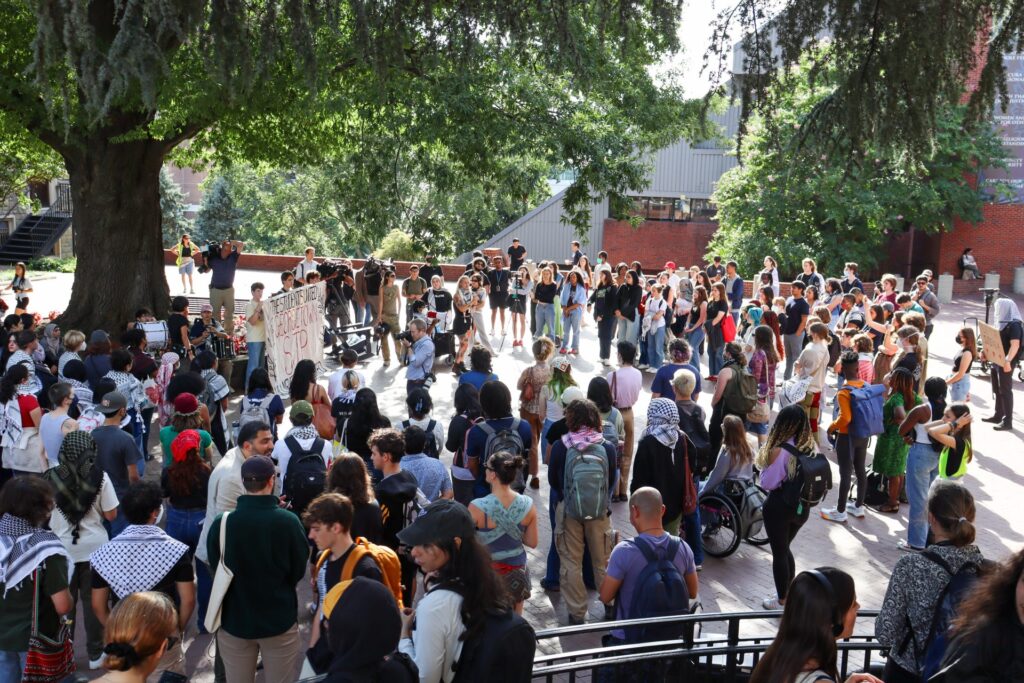 Photo by Connor Martin
Photo by Connor Martin
In the 2024-25 Blueprint Manual, which details guidelines for student organizations receiving funding from the university, student club leaders are asked to consider “risk factors” that could determine whether an event needs GUPD presence. The university makes the final call on if an event needs police and the student organization hosting is responsible for covering this cost.
Item 5 on the list of risk factors in this year’s manual asks: “Are you anticipating any demonstration or protest in opposition to your event’s topic, including those related to Israel, Gaza, and Palestine?”
Student organizers with SJP allege this risk factor specifically targets their demonstrations, and poses an unequal financial burden on their events compared to that of other clubs.
The cost of hiring one GUPD officer is $65.65/hour, and there is a minimum of four hours for which the officer must be paid. GUPD determines how many officers are present at any given event, with GUPD’s standard being “one officer for every 75 event participants.”
Students in SJP shared in their speeches throughout the rally and march that they do not want a GUPD presence at their events, nor do they want to pay for it.
According to a university spokesperson, this policy is not new. Previous blueprint manuals include the GUPD requirement, but do not specifically reference speech related to Israel, Gaza, and Palestine. The spokesperson added that the GUPD requirement does not apply to protests or rallies and does not intentionally target any organization.
“There are no differences in how we implement our policy based on the viewpoint of the event,” the spokesperson wrote in an email to the Voice. “This practice is not new and applies only to event planning. This does not apply to rallies or protests. These policies are applicable to all members of the Georgetown community, including student groups with access to benefits, and Students for Justice in Palestine was not singled out in any way.”
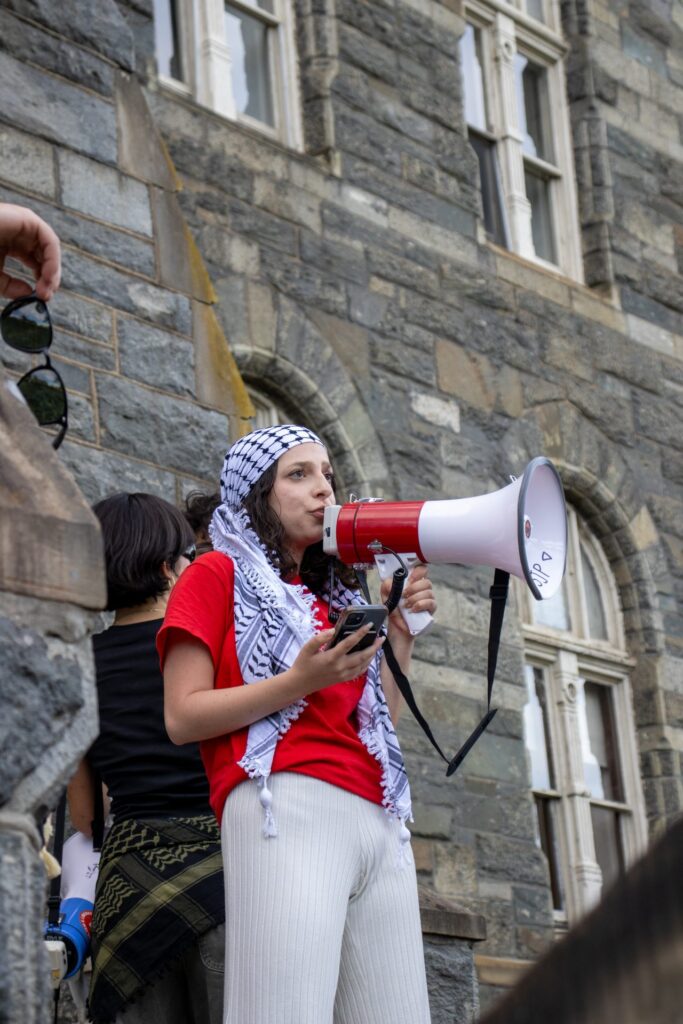 Photo by Connor Martin
Photo by Connor Martin
Miriam Siegel (CAS ’26), who was arrested at the Gaza solidarity encampment in May, spoke to the Voice and shared her frustration with the policy.
“We know that with the level of authority Georgetown has over how and when to enforce this policy, it is inevitable that pro-Palestinian student organizing will be disproportionately targeted,” Siegel said.
Siegel, the co-founder of Georgetown’s chapter of Jewish Voice for Peace, told the Voice that she believes Georgetown’s actions are due to fear of greater student protest this semester after Georgetown students participated in the DMV Gaza Solidarity encampment at George Washington University (GW) last semester.
“I think this entire campaign of repression is Georgetown’s fearful response to what happened at GW last spring,” she said. “The fact that the encampment didn’t happen here means that Georgetown can’t get too comfortable, because it could happen here.”
During the protest, the crowd marched in a loop around campus, pausing at various spots to speak.
Selina Al-Shihabi (SFS ’26), who is Palestinian and has lost several family members in Gaza, spoke during one pause.
“I am a student at Georgetown. I am ashamed,” she said. “Georgetown is an institution who has not taken action. Georgetown is an institution who allows students to suffer in silence.”
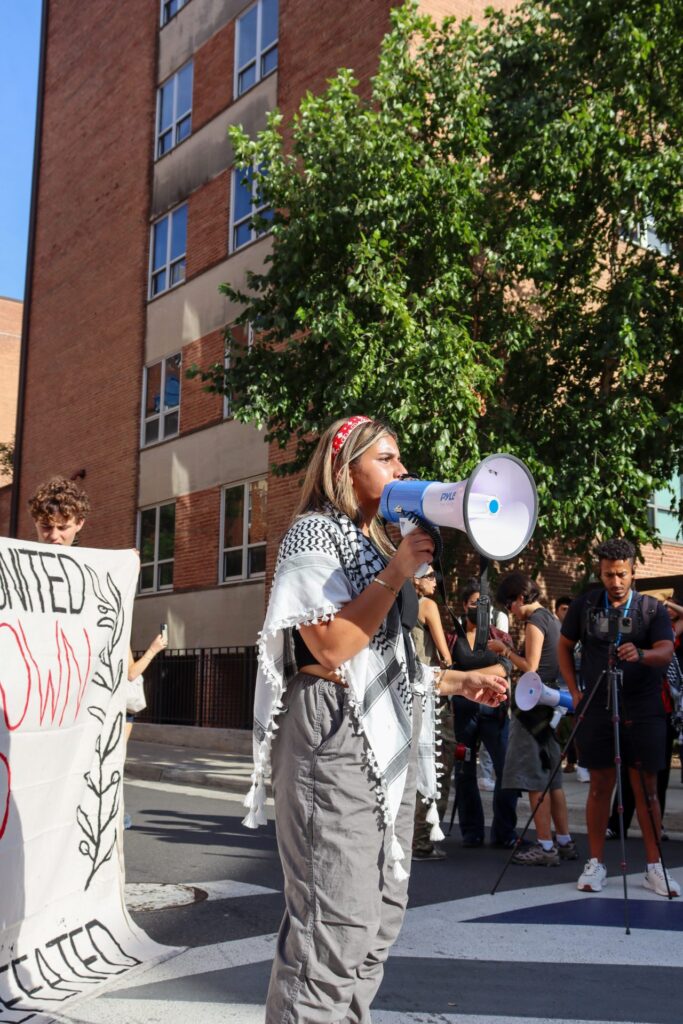 Photo by Connor Martin
Photo by Connor Martin
Al-Shihabi continued that despite nearly a year of negotiations with the university, the administration remains unable to meet their demands.
“Georgetown University, despite almost a year now of meetings, of negotiations, of us begging and pleading […] we have still not seen any tangible changes,” Al-Shihabi said. “Let that settle in—300 days of genocide, and we have not seen any tangible changes.”
Since the spring, students have demanded that the university divest its endowment from companies with ties to Israel, end its study abroad program in Tel Aviv, and take action to protect Palestinian, Arab, and Muslim students on campus.
Currently, Georgetown invests over $40.5 million of its endowment in Alphabet (Google) and Amazon, which contract with the Israeli military to develop Project Nimbus, a cloud-computing system that, according to Google and Amazon workers, is used to surveil Palestinians.
Al-Shihabi then contrasted the hourly pay of GUPD officers and that of dining hall and facilities workers at Georgetown, who have been historically underpaid and exploited.
“How much do we have to pay? $65. Now that’s a stark contradiction from how much they pay the Leo’s workers right behind you,” she said outside the dining hall.
As students began marching again, they clapped and chanted.
“While you’re learning, Gaza’s burning,” they chanted. “While you’re walking, bombs are dropping.”
As the rally came to an end, Siegel addressed the administration and made it clear that SJP would continue to seek an answer to their demands.
“You can send us all to Student Conduct hearings. You can suspend us, expel us, have us arrested, whatever you choose to do, know that our movement will not weaken,” Siegel said. “If there is one more Palestinian child that gets to grow up, or one more inch of land returned to a Palestinian family, it will have all been worth it.”
Connor Martin contributed reporting.
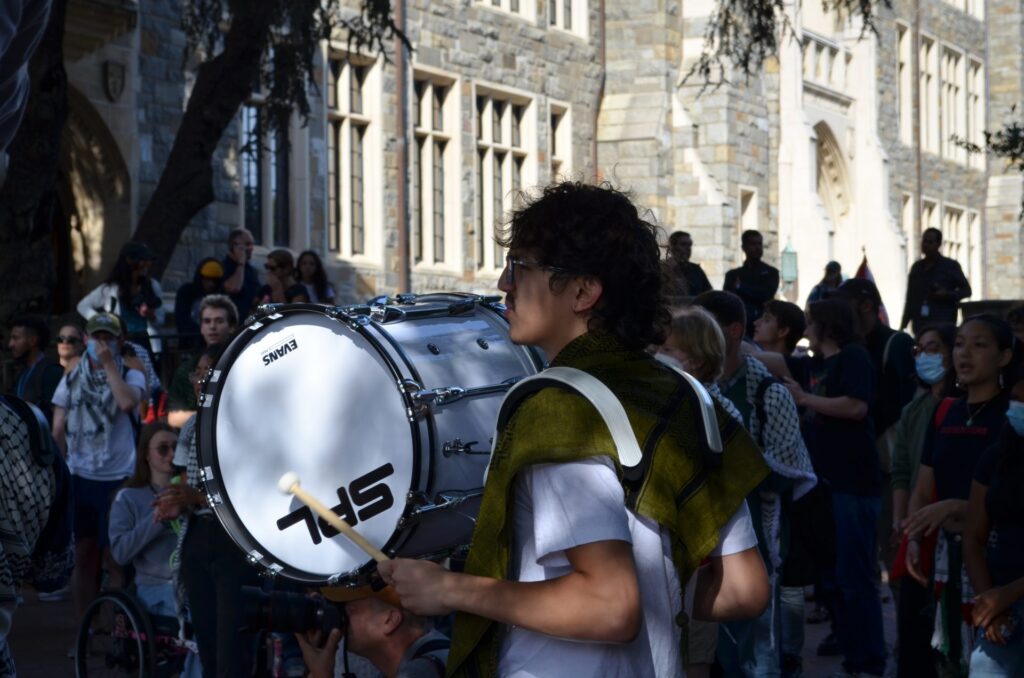 Photo by Sabrina Shaffer
Photo by Sabrina Shaffer
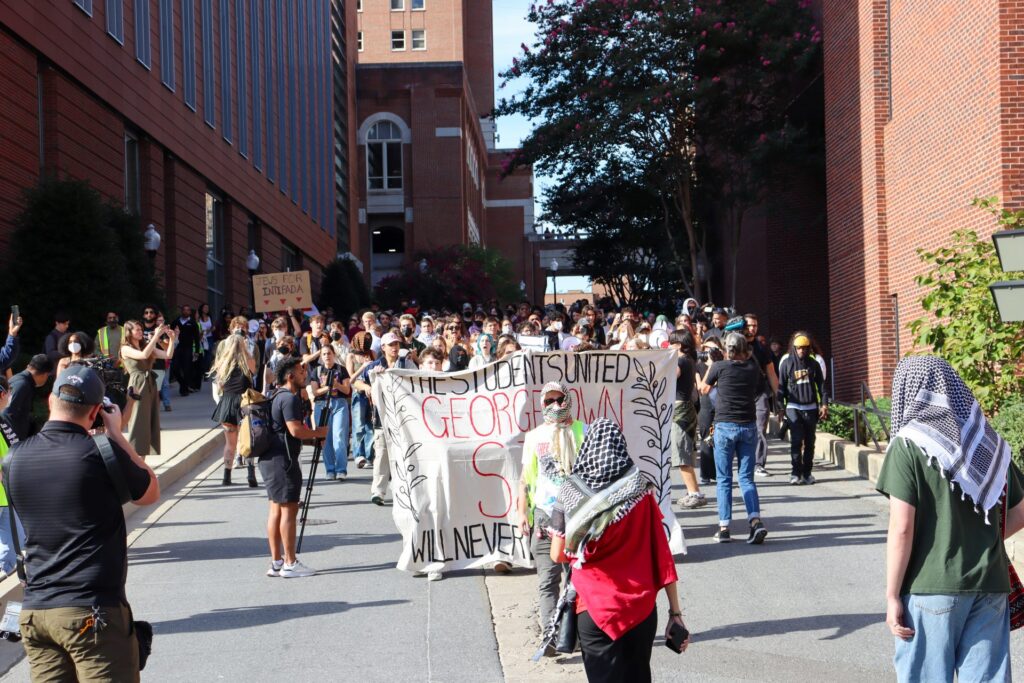 Photo by Connor Martin
Photo by Connor Martin
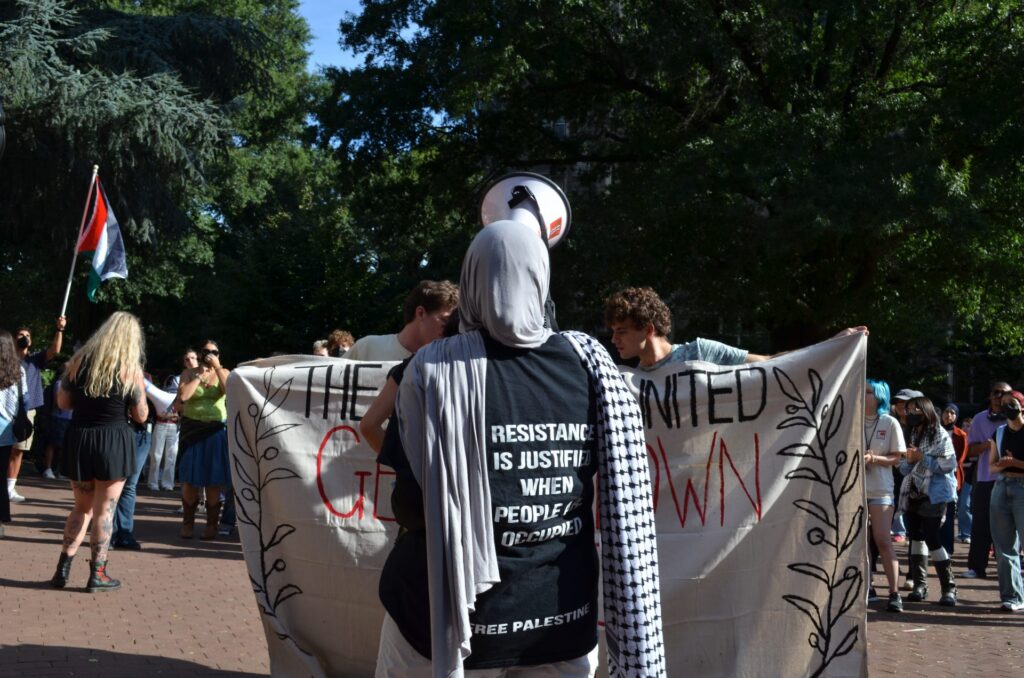 Photo by Sabrina Shaffer
Photo by Sabrina Shaffer
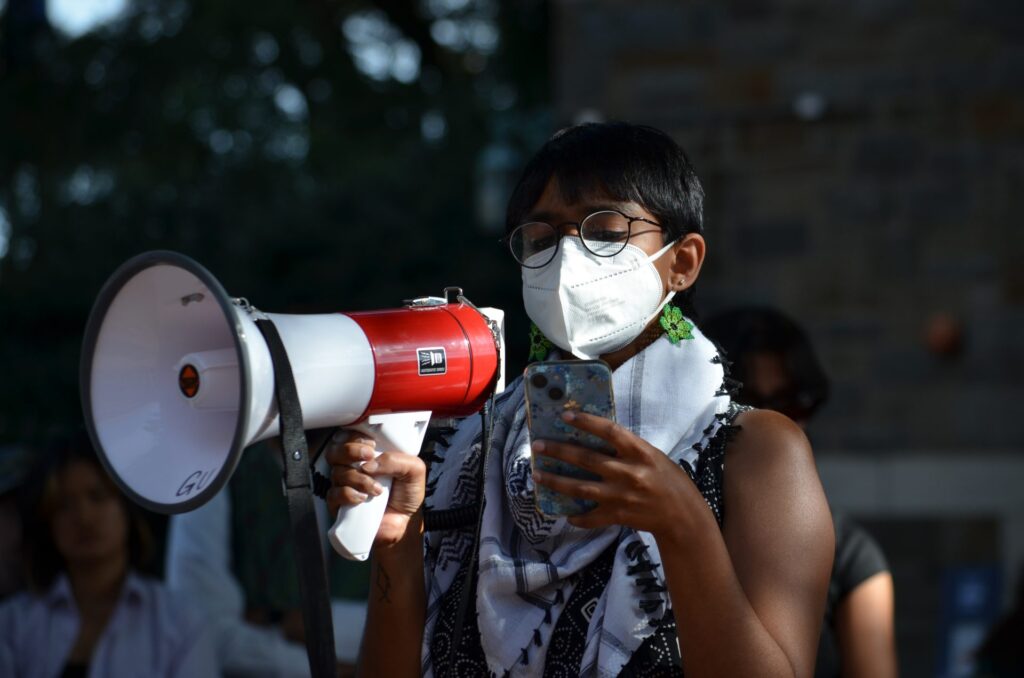 Photo by Sabrina Shaffer
Photo by Sabrina Shaffer
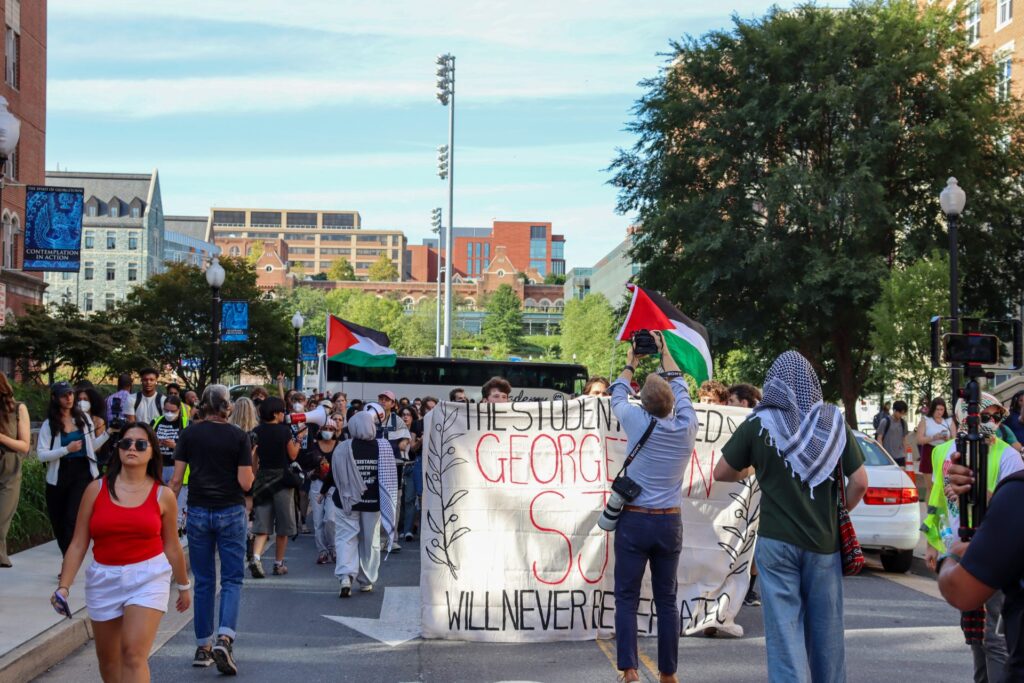 Photo by Connor Martin
Photo by Connor Martin





